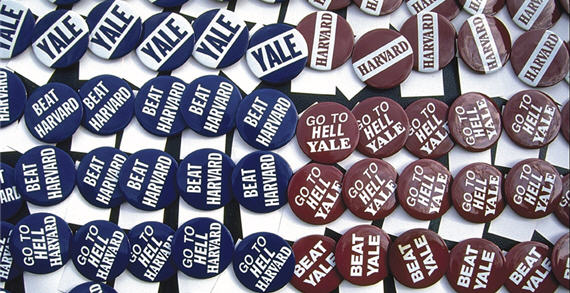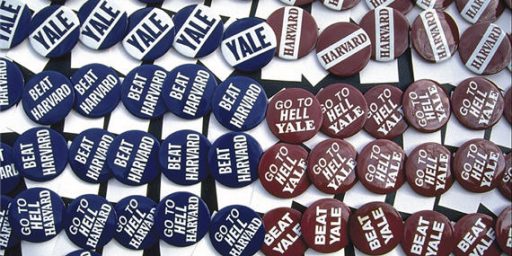Is It Worth Paying For a Yale Education?
Men who graduate elite universities earn an additional $107,000 lifetime. It costs $234,440 to get a Yale degree.
The Atlantic‘s Jordan Weissmann answers the question “Does It Matter Where You Go to College?” in the affirmative. He cites a series of academic studies showing that the eliteness of the college one graduates significantly impacts one’s earnings.
In 2000, a Department of Education report found that, overall, the quality of a college decided 2-to-3 percent of earnings among men and 4-to-6 percent in women — making it less important than how they actually performed in class. But in some cases, the effect was much larger. Men who went to an institution that was one standard deviation better on its quality measures saw their salaries jump 8.1 percent. For women, the boost was 17.4 percent. The report’s author calculated that for males, the increase could translate to an extra $107,000 over the course of a lifetime. For females, it might mean an extra $173,000. To put that in context, people who go to college make somewhere between $412,000 and $570,000 more on average than those who don’t, according to various estimates.
The bold text is mine, highlighting the key takeaway. The problem, of course, is that elite colleges cost a hell of a lot more than those a standard deviation down the totem pole. It costs $58,600 a year to attend Yale, although there is generous financial aid for those in need. That’s $234,400 over the course of four years. An in-state student can go to the University of Connecticut for $22,622 a year, or $90,488 for the four years. That’s a savings of $143,912–which is more than the lifetime increase in earnings for males and only somewhat less than the gain for females.
Wouldn’t students be better off putting the savings in an index fund?
Now, whatever the broad data for graduates across the board show, it’s almost certainly worth going to elite schools if your goal is to work in certain fields. If you want to teach at a major university, it’s almost impossible to do so without a doctorate from an elite institution. Similarly, if you want to write for the New York Times or The Atlantic, especially in your 20s. Or get your foot in the door at a think tank. There are any number of “creative class” jobs where those doing the hiring mainly went to great schools and where those who didn’t do so themselves start with two strikes against them.
There are exceptions in all those fields, of course. But it typically requires a circuitous path. The Times isn’t going to hire some kid right out of Podunk State unless they’ve managed to land a Pulitzer or something; they hire kids right out of Harvard every year. So the Podunk State kid will have to get a job at some regional paper and, well, win a Pulitzer or something.
Of course, one can question whether it’s worth taking on a quarter million in debt for a shot at a low paying job in a dying industry.






This says what I was going to say. Ivy League gets you into a lot of the sort of prestigious jobs that don’t actually pay remarkably well.
It’s an interesting ROI comparison, but I wouldn’t think a typical Yale applicant would care. I’d presume they are spending Dad’s money, and there’s more where that came from.
BTW, did you see The Fall of the Creative Class?
Pretty good read.
This is where I would point out that both Yale, Harvard and many of the more expensive Ivy League schools have huge endowments. Many of those schools actually aren’t as expensive because they have their own need based scale and many students do not pay full price.
If one of my kids was able to get into Harvard or some other Ivy based on our income they would actually attend college at no cost at all (Harvard’s cut off I think is a family with less than 60k per year in income pays no tuition) although there is some variation in the exact cut off. Anyone with incomes higher has the tuition reduced based on a sliding scale. So an income of 60 to 80k might actually be cheaper than attending a more affordable school but without the various endowments.
So, depending on income, I would argue that attending Yale or Harvard may be worth it and doesn’t necessarily mean taking on loans for the full tuition.
College in general is expensive and my general theory as my kids are either in or about to attend college is that loan amounts when college is completed should be somewhere in the car payment and not the house payment range.
I finished a bachelor’s and a master’s degree with just $17k in student loan debt (in 2003 and 2005, respectively) because I went to public, in-state schools. I had no interest in racking up the probable six figure debt more prestigious universities, which I did get into, would have required.
Oddly enough, my cheapo degree was helpful in getting my first job, as the guy who hired me had gotten his master’s at the same university. I don’t think it helped all that much, as there weren’t better candidates for the job at the time, but it certainly didn’t hurt.
A more prestigious degree can be helpful in getting internships and interviews for your first jobs, but that’s about as far as the name value of your university goes. After that, it’s all about performance in most fields. I’m doing pretty well now considering the degrees I hold are not in the highest demand, and the reason is I’ve kicked ass in my jobs and gotten promotions and offers based on my performance. Now that I’ve been in the post-collegiate workforce for almost a decade, I’m quite happy with my choice in university. My loans are paid off and the rest of my career will be built on the successes I’ve had since college, not the name of the school on my diplomas. It just won’t matter what college I went to, and that’s fine by me.
I would also note that my good friend (and brother-in-law) never went to college at all, opting to learn HTML and CSS in the late 1990s and getting a job at a small web-design firm. Fifteen years later and he’s still at that firm, which is now one of the largest in the country, and even with my two degrees I still have not caught up to him in salary (though I’m very close now). If you have a skill that’s in demand, it doesn’t matter if you’ve been to a top-ranked college or no college at all, you can find a good job.
Two of my daughters went to Yale. They got substantial financial aid. One daughter went to Boston University on a full tuition scholarship. You decide.
Yale, Harvard, MIT
Yale, Harvard Law School
Boston U, Columbia School of International Affairs
@john personna: Sure. But then the cost argument is moot.
@Just Me: Yeah, I noted the financial aid issue. I’m just doing apples to apples comparison of paying full freight.
@mantis: There are a whole lot of jobs where people really do seem to care where someone went to school. People are still impressed that people went to Harvard 25 years after the fact. Reagan was the last US president who didn’t go to either Harvard or Yale.
@john personna: I’ll take a look. I didn’t even know “thirty two” magazine existed.
Like Mantis, I went to a state school and my first job was an alumni hire (not that I wasn’t qualified). However, I also work(ed) in a non-glamorous and unpowerful capacity. If I wanted a position of influence, or something really competitive, I would have been better off going to an Ivy League school (that never would have let me in, of course).
@Mary Joan Graves:
The BU graduate wishes she had gone to Yale because BU was too big. But she has stayed on the same career path, international relations. The Yale/Harvard/MIT grad completely switched goals, from chemistry to computers to strategic planning. The Yale/Harvard Law graduate only
attended law school because she didn’t land a challenging journalism job. The political science department was too big; her professors didn’t know her well enough to give her a glowing recommendation or contact anyone on her behalf. She now equally a writer and a human rights lawyer, but she got her jobs primarily because of her excellent blogging.
If we’re talking about a utilitarian degree, especially with financial assistance or a scholarship, then I’d say hell yeah to going to Yale. To me that’s a no brainer. Decades later having the likes of a useful degree from Yale on one’s resume can pay dividends. If, however, we’re talking about some loopy airheaded degree, whether Yale or otherwise, I’d say no f’n way, especially in this new, new economy of ours, and especially if paying full freight.
@Mary Joan Graves:
The human rights lawyer met her wonderful husband, now an economics professor, at the beginning of her sophomore year at Yale. They got married at age 23 and have been happily married for 10 years. They have an incredibly beautiful, brilliant three year old. So Yale was absolutely worth it. That is the only life changing thing that could happen in college, wherever you go.
@James Joyner:
There are a whole lot of jobs where people really do seem to care where someone went to school. People are still impressed that people went to Harvard 25 years after the fact. Reagan was the last US president who didn’t go to either Harvard or Yale.
It’s true, but I think for every one of those jobs, there are 3-5 jobs where they care about experience and nothing else, depending on the industry.
Sure, if you want to get a job at one of the top law firms in NY or DC, you better have an Ivy League degree (and a silver spoon up your ass). For the 99% though, it’s all about experience.
How much difference does that Yale degree make if you’re not working on Wall Street or for a New York law firm?
@mantis:
I wouldn’t say that Big Law entirely depends on one being an Ivy League graduate. It does, of course, offer a major advantage in the weighing process, but no HL graduate with a mediocre GPA is going to get hired, vaunted degree or not, and it’s specious to assert that the bulk of our hires are solely Ivy League.
For example, I work for a Big Law firm. In surveying the other partners in my practice area locally, I see JDs from Montana, Georgetown, Chicago, Virginia, DePaul, Oregon and GW in addition to Harvard and Yale. They receive the same partnership distributions that I do.
So while it’s a nice bennie, it’s no longer the carte blanche that it once was (or that many still believe it to be).
@Dave Schuler:
Virtually none.
@Just Me: Yeah, I noted the financial aid issue. I’m just doing apples to apples comparison of paying full freight.
I think it is important because people who wouldn’t get financial aid at a state school would likely qualify for some at an Ivy-at least up to a certain income. 10k a year in loans from Yale or Harvard would beat 14k per year from a state school.
That said I think having the Ivy League degree probably means more in some fields-especially those where an alumni network can become significant to a career.
@Dave Schuler:
You beat me to it… which also takes me to:
@Trumwill:
True. But they also get a lot of less than obviously qualified individuals jobs that pay a lot of money (if you stick with them). There are a lot of Liberal Arts grads from Harvard, Princeton, and Yale who graduate into Investment Banking Jobs.
@HarvardLaw92:
#uchicagopride — You do realize that Chicago considers itself the equal of Harvard (and that Harvard is where Chicago Professors go when they decide they don’t seriously want to do research anymore). Likewise Georgetown is all but an Ivy. So I’m not sure including either of those two is necessarily helping your argument.
@Trumwill: “This says what I was going to say. Ivy League gets you into a lot of the sort of prestigious jobs that don’t actually pay remarkably well. ”
However, it’s probably quite easy to leverage those positions into higher-paid work. One is already in the proper social class.
@john personna: Important point. I imagine that the number of people both borrowing the money and paying full price is small; most students are either getting a discount on tuition or their parents are covering much of it.
@mantis: “If you have a skill that’s in demand, it doesn’t matter if you’ve been to a top-ranked college or no college at all, you can find a good job. ”
That’s one of those I hear, but have never seen real data on. And in this job market, having the wrong qualifications probably means that your application/resume will never see anything but the recycle bin.
@Tsar Nicholas: “Decades later having the likes of a useful degree from Yale on one’s resume can pay dividends. If, however, we’re talking about some loopy airheaded degree, whether Yale or otherwise, I’d say no f’n way, especially in this new, new economy of ours, and especially if paying full freight. ”
I would think that for many jobs, careers and fields, the resume reads YALE, with the actual field in 6pt font.
@James Joyner
I’ve heard the same thing applies to a lot of the good-paying, entry level Finance jobs in NYC. Bad news considering the “financialization” of the American economy.
@HarvardLaw92
Those aren’t really helping your case. Georgetown, GW, Chicago, and DePaul are all high-level colleges, with Georgetown and Chicago being Ivy-level. Virginia is practically a “public Ivy”, and Oregon is a very good public university as well. Montana is the only odd one standing out there.
I have I have noticed that a 67 year old feminist who stayed at home for 15 years with 4 brilliant daughters is invisible and inaudible to elite feminists. Suppose my child might be like hers if I didn’t put her in daycare at 2 months?
Men have always given me more respect. I made the awful mistake of getting y degrees in library science and social work after my children were older, and I was treated like a beginner.
That may be true for humanities and social sciences, but isn’t true for sciences and engineering, where publications in say Nature or Science from even an obscure university carry much more weight than the prestige of your PhD. Which is why you get Nobel Prize winners from universities you’ve probably never heard of (do a google of universites who’s Phd’s have won Nobel Prizes in the sciences, many you’ll probably never have heard of).
Of course, going to a prestigious university is probably going to improve your odds of getting those kinds of publications (though not much higher chance of a Nobel Prize, curiously enough) because your supervisor is going to have better funding and connections, but its less important than you’d think – lot’s of the biggest names in science have Phd’s from relatively obscure (especially international) universities.
I’ve always assumed that if you’re planning on going into something like law, then Yale or Harvard would be worth it. If you’re going into science or engineering, you’re better off waiting for graduate studies or post-doc, where they pay you (ie if you’re accepted for grad studies you’ll make more than enough to pay tuition and living expenses).
@Brett:
Those aren’t really helping your case. Georgetown, GW, Chicago, and DePaul are all high-level colleges, with Georgetown and Chicago being Ivy-level. Virginia is practically a “public Ivy”, and Oregon is a very good public university as well. Montana is the only odd one standing out there
My case was, on some level, that people decide to conflate Tier 1 with Ivy, and those aren’t bidirectional sets. Harvard is certainly Tier 1, but Alabama (despite being recognized as a Tier 1) isn’t remotely an Ivy.
DePaul is a Tier 3 law school. That said, our DePaul educated partner built a reputation, externally to our firm, as a wizard in aspects of asset protection. That reputation got him hired. Montana, likewise, is a Tier 3. Oregon is a Tier 2.
Underlying point being that while a JD from an Ivy might get you noticed, it alone isn’t going to get you hired, at least not at any of the firms whose practices I’m familiar with. Those days are largely over.